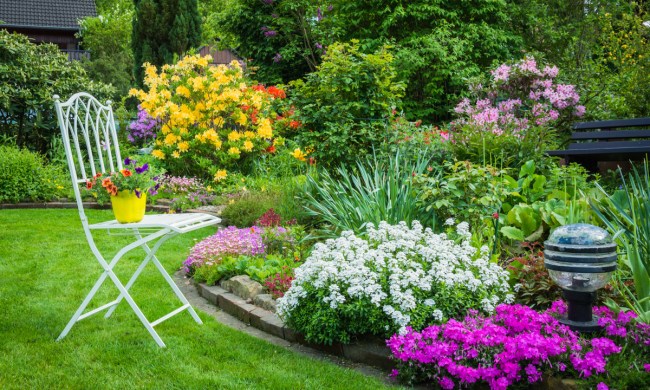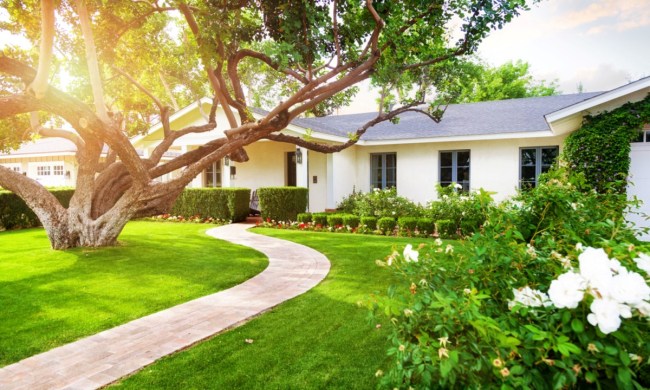
Tired of battling weeds in your garden? These pesky plants can quickly take over gardens, lawns, and even walkways on your property, stealing vital nutrients from your gardens and making an unsightly mess. Commercial weed killers can be expensive, though, and often contain harmful chemicals. Luckily, you can create an effective homemade weed killer using natural ingredients found right in your kitchen! Let’s explore how to make your own weed killer in just a few simple steps so you can clear your garden of weeds.
The natural ingredients in your homemade weed killer

When it comes to killing weeds naturally, three key ingredients stand out: vinegar, dish soap, and table salt. These common household items work together to effectively eliminate unwanted vegetation without harming the environment or your garden.
Vinegar
Vinegar is a common cleaning agent, but it’s also a potent weed killer because of its high acidity. When applied to weeds, vinegar works to dry out the plant, ultimately killing it. The best part? Vinegar is nontoxic, making it safe for use in vegetable gardens and flower beds with delicate blooms. By opting for vinegar-based weed killer, you can effectively combat weeds while minimizing harm to the environment.
Dish soap
Dish soap serves as a surfactant in homemade weed killer, helping the vinegar to adhere to the weed’s surface. This allows for better penetration and absorption, ensuring that the vinegar can work its magic more effectively. Additionally, dish soap is mild and won’t harm beneficial insects in your garden, making it an eco-friendly choice for weed control.
Table salt
Adding ordinary table salt to your homemade weed killer is optional, but it can provide an extra boost in effectiveness. Salt works by dehydrating the weed, causing it to wither and die. Additionally, small amounts of salt in your garden can attract bees and other pollinators, benefiting your overall garden ecosystem.
How to make homemade weed killer

Making your own weed killer is quick and easy. Here’s what you’ll need:
Ingredients:
- 1 gallon of vinegar
- 1 tablespoon of dish soap
- 1 cup of table salt
- Spray bottle
- Personal protective gear
Method:
- Mix the vinegar, dish soap, and table salt together in a large container.
- Stir the ingredients until the salt is completely dissolved.
- Transfer the mixture to a spray bottle for easy application.
- Protect your skin during application by wearing gloves, long sleeves, and pants.
- Spray the homemade weed killer directly onto the leafy flesh of weeds, ensuring thorough coverage. Try not to spray on any other surrounding plants or directly onto the soil.
- Allow the solution to sit on the weed for a few hours or overnight if possible.
- After the allotted time, check on the weeds. They should begin to wither and die.
- For stubborn weeds, repeat the application as needed until they are completely eradicated.
Cautions when using homemade weed killer

While homemade weed killer is a safe and effective alternative to commercial products, it’s important to use caution when applying it in your garden. Just like this solution dehydrates weeds, it can do the same to other plants. Excessive use of vinegar, dish soap, or salt can harm surrounding plants and soil, so be sure to apply the solution sparingly.
Additionally, excessive amounts of vinegar and salt in your garden can repel and even harm beneficial insects like honeybees. That’s why you should avoid spraying on windy days to prevent drift onto desirable plants. By following these precautions, you can effectively control weeds while maintaining a healthy garden ecosystem.
Creating homemade weed killer is a simple and eco-friendly solution for weed control in your garden. By harnessing the power of natural and gentle ingredients like vinegar, dish soap, and table salt, you can safely and effectively eliminate weeds without harming yourself, the environment, or your plants. Whether you’re tending to a fruitful vegetable garden or a flower bed, homemade weed killer offers a safe and sustainable alternative to commercial products. Give it a try and enjoy a weed-free garden all season long!



